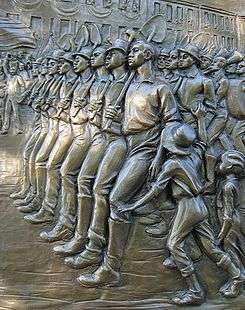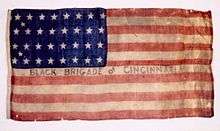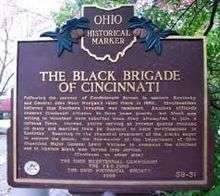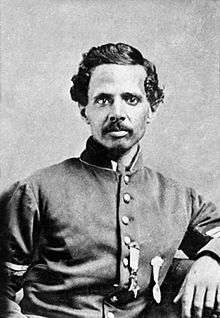Black Brigade of Cincinnati
| Black Brigade of Cincinnati | |
|---|---|
 The Black Brigade of Cincinnati American Civil War Memorial honors the forcibly, conscripted, African American citizens, who constructed the defensive fortifications, around Cincinnati, Ohio, during the American Civil War, in preparation of a potential, Confederate attack. The Brigade would later shoulder their shovels in a military manner and march in the victory parade through the city. | |
| Active | September 2, 1862 - September 20, 1862 |
| Allegiance | United States of America |
| Branch |
Cincinnati volunteer militia Union Army |
| Type | conscripted labor detail for construction of fortifications |
| Size | battalion-brigade (700) |
| Nickname(s) | Black Brigade |
| Engagements | No combat experience |
| Commanders | |
| Notable commanders |
|


The Black Brigade of Cincinnati was a military unit that was organized in 1862 during the American Civil War, when the city of Cincinnati, Ohio, was in danger of being attacked, by the Confederate Army. The members of the Cincinnati "Black Brigade" were among the very first African Americans to be employed in the military defense of the Union.
Brigade service
In the early years of the American Civil War, Ohio was a free state and slavery was illegal. In southern Ohio, the pro-slavery city of Cincinnati lies along the Ohio River, which bordered the Union-held slave state of Kentucky. On September 2, 1862, with the imminent threat of a Confederate attack, half of the city's white citizens supported the forcible rounding up, many times at gunpoint, of all available free black, adult, male citizens by the Cincinnati police force and their impressed into temporary forced labor, in the construction of fortifications.

These men were treated like slaves during the construction of the defensive perimeter, around Cincinnati, on the Ohio and Kentucky sides of the river. Between the harsh working conditions imposed on the black conscripts and the extreme brutality of the quasi-military police guards, the fortifications were eventually completed. Soon after, Union Army officer Major General Lew Wallace put Colonel William M. Dickson in charge and made sure the men finally received the fair treatment due to soldiers. The soldiers of the Black Brigade received their own military unit flag and $13 a month, Union Army private's pay. The Brigade continued to work as a labor detail until September 20. The Brigade had only one fatality: Joseph Johns who was killed in an accident on September 17, 1862. Because of the racial segregation of the military at that time, the city would not allow black men to join the all white volunteer militia. The Black Brigade was never intended to serve as armed soldiers, and saw no combat during the war.
The officers of the brigade as of September 6, 1862 were all white, and included: commander, William M. Dickson; Adjutant-General, T. C. Day; Commissary, H. McBurney; Quartermaster, J. S. Hill; Assistant Adjutant-General, Jacob Reior.[1]
Uniforms
The Black Brigade of Cincinnati were never issued Union Army uniforms during their short service, but wore the civilian clothes they had on their backs, when they were forcibly conscripted, for military labor duty.
Legacy
The Black Brigade of Cincinnati was later recognized as the first organization of African Americans to be used for military purposes by the North during the American Civil War.
Memorial monument
On September 9, 2012, a Civil War memorial monument to the Black Brigade, created by sculptors John Hebenstreit and Carolyn Manto, was dedicated on the 150th anniversary of the 1862 defense of Cincinnati in Smale Riverfront Park, in Cincinnati.
See also
References
- ↑ Defense of Cincinnati, Daily Ohio Statesman (Columbus, Ohio) September 6, 1862, page 2, accessed February 6, 2017 at https://www.newspapers.com/clip/8786789/defense_of_cincinnati_daily_ohio/
Further reading
- Brown, William Wells.The Negro in the American Rebellion: His Heroism and His Fidelity. Boston: Lee & Shepard, 1867.
- Clark, Peter H. Black Brigade of Cincinnati: Being a Report of Its Labors and a Muster-Roll of Its Members etc.. Cincinnati: Joseph B. Boyd, 1864.
- Dickson, William Martin. Enrollment and Report of the "Black Brigade" of Cincinnati.
- Greve, Charles Theodore. Centennial history of Cincinnati and representative citizens, Volume I. Chicago: Biographical Publishing Company, 1904.
- Suess, Jeff. Hidden History of Cincinnati. Mount Pleasant, South Carolina: Arcadia Publishing, 2016.
- Taylor, Nikki M. America's First Black Socialist: The Radical Life of Peter H. Clark. University Press of Kentucky, 2013.
